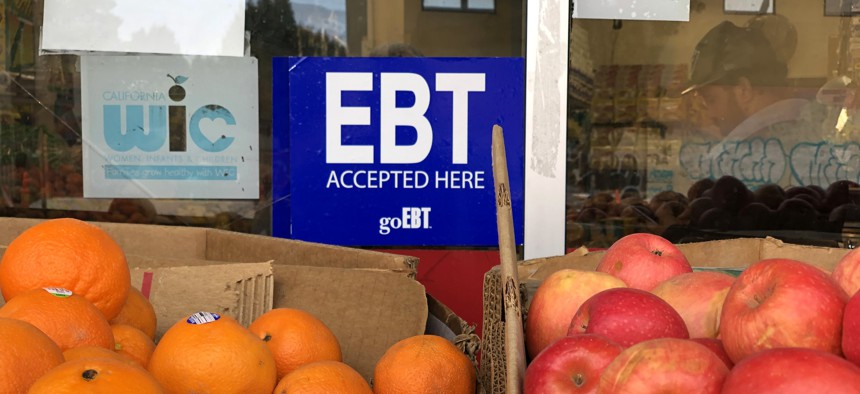SNAP Emergency Allotments Scheduled to Terminate in March

Justin Sullivan via Getty Images
According to hunger relief experts, amending the 2023 Farm Bill is the only sustainable way to shield rural households from increased food insecurity long-term.
This article first appeared on The Daily Yonder and is republished here under a Creative Commons license.
The 42 million Americans who receive money through the Supplemental Nutrition Assistance Program, also known as SNAP, will be bracing for changes to the program when emergency allotments stemming from the Covid-19 pandemic expire in March.
Experts say the end of the emergency allotments could leave vulnerable populations, including children and seniors, in precarious positions when it comes to hunger. SNAP participants in rural counties constitute the largest segment of the U.S. population receiving the payments.
“This is going to leave many families, particularly those in rural America, struggling to put food on the table as benefits will drop about $90 per month for some people,” Cassidy Pont, the lead policy advocate for Domestic Child Nutrition with Save the Children, told the Daily Yonder.
Already, Pont said, children in rural America are struggling with hunger and rising food prices.
“We know that child hunger is worse in rural America,” she said. “Nearly 90% of counties with the highest food insecurity rates are rural, and about one in five rural children are facing hunger for a projected increase higher than pre-pandemic levels. A recent survey has shown that half of rural parents say that they're struggling to afford to feed their families.”
Several barriers add to the situation, including geographic isolation, lack of transportation, transportation, infrastructure, and limited access to stores with fresh food, she added.
“All of these things make it very difficult for those rural families to provide their children the nutritious foods they need to grow and develop,” Pont said. “Additionally, I think it's good to also frame the grocery store scene in rural America. We know that rural communities rely on those smaller independent grocery stores and supermarkets compared to metro-area households, and because of that, they often face higher food prices.”
The final SNAP Emergency Allotment payments for February will be issued to SNAP households in mid-March, said Anore Horton, executive director of Hunger Free Vermont.
The other temporary Covid-era SNAP provisions are the suspension of benefit time limits for people who must meet a work requirement and the suspension of the work requirements for some college students.
“These temporary provisions do not end in February with the end of emergency allotments,” Horton said. “However, the Biden Administration's announcement that they will end the declaration of the Covid-19 health emergency on May 11 means that by mid-June, all of these work requirement rules will have to be reinstated, cutting many people off from SNAP benefits entirely.”
In the Northeast, Hunger Free Vermont is working with Vermont's Department for Children and Families, which administers the SNAP program, to get the word out about the changes, Horton told the Daily Yonder.
“The challenge is that no one was expecting this abrupt end to emergency allotments,” Horton said. “And so the timing of planning, all of that communication has had to get really sped up, but we are working closely with our Department for Children and Families in Vermont. They're a great partner, and they try really, really hard to take good care of people on the SNAP program. And so we will be working with them closely to get communications out about this to people.”
Horton said a lot of rural states are populated by aging populations, and Vermont is no different.
“So because a lot of households that consist of people who have retired, those households are living on a fixed income, and they are getting income from Social Security, from their pensions and savings,” she said. “And it's enough income, so that those households qualify for kind of the minimum benefit for their household under SNAP. So these are folks who really do need help to afford healthy food to keep them healthy and going strong.”
Horton said that in rural states, food is also often grown, bringing in additional money. Vermont households collectively receive about $18 million in SNAP benefits each month. About $6.5 million, or 36%, of that total are the emergency allotments.
“So, SNAP households in Vermont, and therefore the Vermont food economy, will have $6.5 million per month less circulating through the local general stores, supermarkets, and farmers markets every month once the emergency allotments end,” she said.
Both Pont and Horton said changes to the Farm Bill, including expanding access to SNAP and eligibility requirements, is the best solution forward.
“A lot of what needs to be done is that we all need to put a lot of pressure on Congress to create a Farm Bill that is more just and that actually gets closer to providing people an adequate budget for food in this 2023 session of Congress,” Horton said.
Pont echoed that statement, urging people to pay attention to the discussion around the Bill and get involved with action. “We will continuously be updating our action alerts and different ways to get involved to also lend other people's voice to this urgent action and solution with the Farm Bill,” she said.
![]()
NEXT STORY: Bias Trainings for Police Don't Change Behavior





